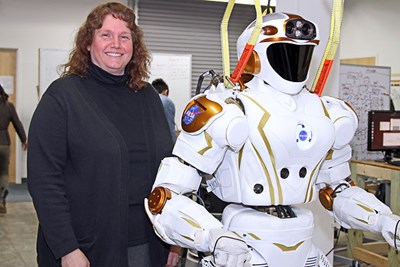Kacey Beddoes Awarded $508,000 NSF CAREER Grant
 Image by K. Webster
Image by K. Webster
10/23/2017
By Katharine Webster
Asst. Prof. Kacey Beddoes has won a prestigious National Science Foundation grant to study gender in engineering workplaces – and to find ways to promote a more inclusive and diverse workforce.
The $508,000 NSF CAREER grant builds on her two previous NSF grants: one on discourses in engineering education that looks at how engineering faculty think and talk about gender in their field, and the other on the dynamics of interdisciplinary teams.
Her latest grant, “Characterizing Gendered Socialization of Newcomer Engineers,” will fund an in-depth, long-term study comparing the experiences of young women and men at the start of their careers in civil engineering.
“Nearly 40 percent of women leave science and engineering within their first five to 10 years on the job.” -Asst. Prof. Kacey Beddoes"Nearly 40 percent of women leave science and engineering within their first five to 10 years on the job," she says. "We need to better understand why they leave."
Beddoes, who is in the Sociology Department, will recruit equal numbers of women and men as study participants this spring as they get ready to graduate from college. She will look at the workplaces where they start their careers and then follow them during their first four years in the workforce, interviewing them every six months and having them complete a survey once a month.
The study participants will be recruited from national listservs, where Beddoes hopes to enlist civil engineering graduates who are also racially and ethnically diverse. She will look at their social interactions at work, how welcome or excluded they feel and any barriers they encounter.
Beddoes says that while an enormous amount of time and money has been spent over the last four decades on attempts to get more women to pursue careers in science and engineering, equity is still elusive. In her view, that’s because nearly all the research on the topic focuses on women as the location of the “problem,” rather than on gender biases in institutional cultures and policies.
“My research focuses on majority populations as well,” Beddoes says. “Both the research and the interventions will be about men and masculinity as much as women.”

The grant, which was awarded by the NSF’s Engineering Education and Centers program, includes an educational component. Beddoes will make recommendations, based on her study results, to improve civil engineering capstone classes.
She’s also teaching her first honors class at the university this semester, Gender and Engineering. Qiana Curcuru, an honors mechanical engineering major and president of the student chapter of the Society of Women Engineers, says she loves the class.
“This is a great way to strengthen my understanding of issues women might face in the workforce and to help the members of SWE,” she says.
Two honors students will be joining Beddoes’ research group this year. Management information systems major Sherlin Thomas will work on a project about global engineering, while David Mendelsohn, a bio-cheminformatics major, will work on an interdisciplinary teamwork project.
Beddoes is an associate of the university’s Center for Women and Work and also heads Research In Sociology of Engineering,an interdisciplinary group of researchers from several universities that explores how social processes shape engineering and engineering education.




